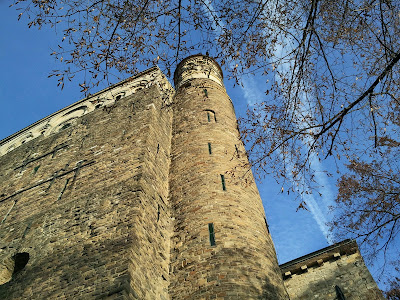
[We are all] like tea bag[s]. [We] only know [our] strength when put into hot water. - Nancy Regan.
It seems that I’ve developed a habit for starting each post with a quotation, and in the end they are but snappy summaries of my week…but as we say in the Netherlands Al regende het varkens, je krijgt er geen borstel van, literally meaning Even a rain of pigs doesn't give you a brush and figuratively meaning, that me using someone else’s words doesn’t really count as a blog now does it? So here we go…
Last time I left you we had all arrived back at our own little palace, the UniMaa Guesthouse, a day before we would start the whole course. A quick word about the Guesthouse to anyone thinking of coming on this course in the future, we think it’s an old mental institute, that might be because all of us here are a bit batty ourselves, or maybe it’s the ghosts we’ve seen walking around, either way the rooms are actually really spacious and equipped and it’s fun to try to scare your roommates with a few mental stories here and there! I guess that’s what that first week was for though, getting the vibe of the place, becoming realmates with your roommates (just a shout out to my corridor, GroundControl!) and getting a sense of friendship in the group…because little did we know we’d need it when the course put us through our paces.
The only challenge on that first Monday morning though was getting used to waking up at a respectable hour. It seems we’d all been lulled into a false sense of security by our Australian holiday season and the lifestyle of your standard dirty backpacker. To shake the sleep from our eyes however: a day of touring the beautiful little historic hub that is Maastricht. What a town. Middle aged walls half buried, a striking red church clock tower adjacent a 13th century cathedral, the secret to why we toast drinks ‘to our health’ or buy our mates ‘a round’, a sea of Roman aged tunnels leading all the way to the Belgian border, the elegant Apostelhoeve winery and of course our beloved Vrijthof, or as we say in the Netherlands…oh wait it’s just Vrijthof. But as I said, this was all just the calm before the storm…


The electric Professor Matt Heckman is a force to be reckoned with. For those at home thinking of coming over, I don’t mean to scare you but the dynamic speed and content of this course mesmerised me on the first the day. He manages to bring together law, economic, international relations and politics in a homogenous program that while I have found challenging (let’s face it I could just be a bit more simple than the other students) I have equally found rewarding. On Wednesday, after our jaws had been scooped up off of Tuesday’s floor, we were keeping pace without any chance of being bored, but as Nancy Regan has said, how do we know ourselves until we’re placed in some hot water?
Luckily, we had some student guides to help us cool off. Our traditional Dutch ‘Pancake Night’…or as we say in the Netherlands Pannenkoeken Avond…soon turned into an indoctrination into the culture of the Netherlands that was not only joyfully taken, but proactively craved. Despite our Aussie Masterchef team of myself and Sophie outshining the Dutch students in the realm of whipping up a pannenkoeken feast, the night lead to something else traditionally Dutch…a spot of drinking! We struggled to learn to count from five backwards in Dutch in order to play a certain party game, but now that the night is over, I struggle to count up from one. Veive, Veer, Dree, Drei, Eine! We were also introduced to the Highlander, one of our most beloved institutions in the whole of the Netherlands, a night some of us will never forget and a select few will never remember!

So after the week that was, we find ourselves sitting in Brussels on a group weekend trip, post the hectic week of learning. But don’t think that Brussels is an exception to the week’s rule, just as much learning has occurred here at the European Parliament and European Commission as has occurred in our familiar little multi-coloured lecture hall. After visiting the world-voted best and biggest bar in the world with the world’s largest selection of beers, it was a necessity to visit the adjacent bar that conveniently contained the world’s largest array of Absinth. This cosy little corner contained Absinthe ranging from a mere 30% alcohol content l to a colossal 92%. With the sole pure intention of blog investigation, I thought it necessary to join some friends who were sampling said 92% absinthe shot. Suffice to say my sinuses are now clear.

With an historical tour of this amazing city to get to, and another day of bathing in history and information to enjoy I guess it’s time I said goodbye for this week…or as we say in the Netherlands, HOI HOI!


Nathan Johnston is participating in our January 2012 International Relations and Politics in the EU program at Maastricht University, the Netherlands. Nathan is about to enter into his 2nd year of a Combined Bachelor of Laws/International Studies degree at the University Wollongong.























